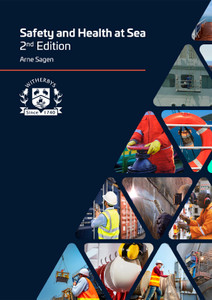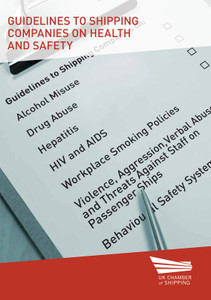
This publication presents the texts of the Hong Kong International Convention for the Safe and Environmentally Sound Recycling of Ships, 2009, the six Conference resolutions, and the six sets of guidelines developed and adopted by the MEPC. It provides a global, comprehensive overview of ship recycling, ensuring standards are upheld throughout a ship’s life cycle.
In
addition
to
Hong
Kong
Convention
articles,
Conference
resolutions
and
guidelines,
this
publication
includes
an
information
document
on
the
method
to
calculate
the
recycling
capacity
of
States
for
meeting
entry-into-force
requirements.
The
Ship
Recycling
Facility
Plan
(SRFP)
is
also
expanded
upon,
explaining
the
importance
of
personnel
health
and
safety,
protection
of
the
environment
and
regulatory
compliance.
Practical
guidance
is
given
on
job
hazard
management
and
the
management
of
hazardous
materials.
Ship
recycling
was
first
brought
to
the
attention
of
the
Marine
Environment
Protection
Committee
(MEPC)
of
the
International
Maritime
Organization
(IMO)
in
1998,
when
Norway
proposed
that
it
be
included
as
a
high
priority
item
in
the
work
programme
of
the
MEPC,
in
order
to
develop
an
internationally
acceptable
instrument
for
reducing
environmental,
occupational,
health
and
safety
risks
associated
with
the
demolition
and
scrapping
of
ships
that
had
reached
the
end
of
their
useful
operating
life.
In
March
2000,
ship
recycling
was
formally
included
in
the
agenda
of
the
MEPC
44
session.
Ship
recycling
is
a
long
established
practice
for
dealing
with
ships
at
the
end
of
their
commercial
life
and
is
widely
regarded
as
the
best,
ie,
most
practicable,
option.
It
contributes
to
sustainable
development
because
virtually
every
part
of
a
ship’s
hull,
machinery,
equipment,
fittings
and
even
furniture
is
recycled
for
re-use
in
many
different
sectors.
This
is
particularly
the
case
in
less
developed
countries
where
the
recycling
industry
creates
economic
development
for
local
and
regional
communities,
generating
large
scale
direct
employment
as
well
as
additional
employment
and
economic
activity
from
its
associated
industries,
including
extensive
trading
in
second
hand
equipment
and
machinery.
While
the
principle
of
ship
recycling
is
sound,
the
working
practices
and
environmental
standards
in
recycling
facilities
often
leave
much
to
be
desired.
Following
extensive
discussion
over
several
sessions
of
the
MEPC,
the
IMO
Guidelines
on
Ship
Recycling
were
adopted
by
the
IMO
Assembly
(twenty-third
session)
through
Assembly
resolution
A.962(23)
of
5
December
2003,
to
provide
guidance
to
all
stakeholders
involved
in
ship
recycling.
Amendments
to
the
Guidelines
were
adopted
by
the
Assembly
two
years
later
(twenty-fourth
session)
through
Assembly
resolution
A.980(24)
of
1
December
2005.
The
Guidelines
apply
a
‘cradle-to-grave’
approach,
recognising
that
it
is
necessary
to
take
account
of
the
ship
throughout
its
life
cycle
in
order
to
improve
ship
recycling
standards.
At
the
twenty-fourth
Assembly,
it
was
also
decided
that
a
new
IMO
instrument
should
be
developed
in
order
to
minimize
the
environmental,
occupational,
health
and
safety
risks
associated
with
ship
recycling
in
the
most
effective,
efficient
and
sustainable
way
whilst,
at
the
same
time,
taking
account
of
the
particular
characteristics
of
international
shipping
and
the
need
to
ensure
the
smooth
withdrawal
of
end-of-life
ships.
This
decision
was
in
line
with
the
request
of
the
Conference
of
the
Parties
to
the
Basel
Convention
in
its
Decision
VII/26,
at
the
Seventh
Meeting
of
the
Conference
of
its
Parties
in
October
2004,
for
IMO
to
establish
in
its
regulations
mandatory
requirements
that
ensure
an
equivalent
level
of
control
as
established
under
the
Basel
Convention
and
to
continue
work
aimed
at
the
establishment
of
mandatory
requirements
to
ensure
the
environmentally
sound
management
of
ship
dismantling.
Specifically, it was decided that the new instrument should be mandatory in nature and global in scope, providing legally binding and globally applicable regulations for ships and for facilities recycling ships. It was further envisaged that the instrument would address the design, construction and operational practices of ships with a view to facilitating their safe and environmentally sound recycling, and the operational systems and procedures of ship recycling facilities in order to improve upon their safety and environmental standards.
The
instrument
would
also
foresee
an
appropriate
enforcement
mechanism,
including
certification
and
reporting
requirements.
Accordingly, from 2005 onwards, the Working Group on Ship Recycling, established by the MEPC, focused on the development of a new IMO convention on ship recycling. The draft text was developed with input from IMO Member States and relevant non-governmental organizations, and in co-operation with the International Labour Organization and the Parties to the Basel Convention, and their respective Secretariats. On 15 May 2009, the Hong Kong International Convention for the Safe and Environmentally Sound Recycling
of
Ships,
2009
(the
Hong
Kong
Convention)
was
adopted
by
a
diplomatic
Conference
in
Hong
Kong,
China,
together
with
six
conference
resolutions.
The
Convention
was
open
for
signature
at
the
IMO
Headquarters
Hong
Kong
Convention
viii
from
1
September
2009
until
31
August
2010.
Thereafter,
it
became
open
for
accession.
The
Hong
Kong
Convention
has
not
yet
entered
into
force.
Several
articles
and
regulations
of
the
Hong
Kong
Convention
make
reference
to
guidelines
to
be
developed
by
the
Organization.
Correspondingly,
the
diplomatic
Conference
adopted
Conference
resolution
4
inviting
IMO
to
develop,
as
a
matter
of
urgency,
six
specific
sets
of
guidelines,
and
other
guidelines
or
circulars
as
may
be
identified
by
the
MEPC,
and
to
adopt
them
as
soon
as
practicable
and,
in
any
case,
before
the
entry-into-force
of
the
Hong
Kong
Convention,
with
a
view
to
facilitating
its
global
and
uniform
implementation.
As
instructed
by
the
Conference,
the
MEPC
developed
and
adopted
the
six
sets
of
guidelines
identified
in
Conference
resolution
4.
The
first
guidelines
were
adopted
by
MEPC
59
in
July
2009
and
subsequently
amended
by
MEPC
62
in
July
2011:
the
2011
Guidelines
for
the
development
of
the
Inventory
of
Hazardous
Materials
(resolution
MEPC.197(62)).
Also
adopted
by
MEPC
62
were
the
2011
Guidelines
for
the
development
of
the
Ship
Recycling
Plan
(resolution
MEPC.196(62)).
In
March
2012,
MEPC
63
adopted
the
2012
Guidelines
for
safe
and
environmentally
sound
ship
recycling
(resolution
MEPC.210(63))
and
the
2012
Guidelines
for
the
authorization
of
ship
recycling
facilities
(resolution
MEPC.211(63)).
The
remaining
two
sets
of
guidelines
were
adopted
by
MEPC
64
in
October
2012:
the
2012
Guidelines
for
the
survey
and
certification
of
ships
under
the
Hong
Kong
Convention
(resolution
MEPC.222(64))
and
the
2012
Guidelines
for
the
inspection
of
ships
under
the
Hong
Kong
Convention
(resolution
MEPC.223(64)).
This publication presents the texts of the Hong Kong International Convention for the Safe and Environmentally Sound Recycling of Ships, 2009, the six Conference resolutions, and the six sets of guidelines developed and adopted by the MEPC. In addition, it presents an information document on the method to calculate the recycling capacity of States for meeting the capacity criterion of the entry-into-force requirements of the Convention.
Article 1 General obligations
Article 2 Definitions
Article 3 Application
Article 4 Controls related to ship recycling
Article 5 Survey and certification of ships
Article 6 Authorization of ship recycling facilities
Article 7 Exchange of information
Article 8 Inspection of ships
Article 9 Detection of violations
Article 10 Violations
Article 11 Undue delay or detention of ships
Article 12 Communication of information
Article 13 Technical assistance and co-operation
Article 14 Dispute settlement
Article 15 Relationship with international law and other international agreements
Article 16 Signature, ratification, acceptance, approval and accession
Article 17 Entry into force
Article 18 Amendments
Article 19 Denunciation
Article 20 Depositary
Article 21 Languages
Chapter 1 General provisions
Chapter 2 Requirements for ships
Chapter 3 Requirements for ship recycling facilities
Chapter 4 Reporting requirements
Appendix 1 Controls of hazardous materials
Appendix 2 Minimum list of items for the Inventory of Hazardous Materials
Appendix 3 Form of the International Certificate on Inventory of Hazardous Materials
Appendix 4 Form of the International Ready for Recycling Certificate
Appendix 5 Form of the authorization of ship recycling facilities
Appendix 6 Form of report of planned start of ship recycling
Appendix 7 Form of the statement of completion of ship recycling
Resolutions adopted by the Conference
Resolution 1 Expression of appreciation to the host Government
Resolution 2 Contribution of the Parties to the Basel Convention and the International Labour Organization in the development of the Hong Kong International Convention for the Safe and Environmentally Sound Recycling of Ships, 2009
Resolution 3 Promotion of technical co-operation and assistance
Resolution 4 Future work by the Organization pertaining to the Hong Kong International Convention for the Safe and Environmentally Sound Recycling of Ships, 2009
Resolution 5 Early implementation of the technical standards of the Hong Kong International Convention for the Safe and Environmentally Sound Recycling of Ships, 2009
Resolution 6 Exploration and monitoring of the best practices for fulfilling the requirements of the Hong Kong International Convention for the Safe and Environmentally Sound Recycling of Ships, 2009
Guidelines
Resolution
MEPC.197(62)
2011
Guidelines
for
the
development
of
the
Inventory
of
Hazardous
Materials
Resolution MEPC.196(62) 2011 Guidelines for the development of the Ship Recycling Plan
Resolution MEPC.210(63) 2012 Guidelines for safe and environmentally sound ship recycling
Resolution MEPC.211(63) 2012 Guidelines for the authorization of ship recycling facilities
Resolution MEPC.222(64) 2012 Guidelines for the survey and certification of ships under the Hong Kong Convention
Resolution MEPC.223(64) 2012 Guidelines for the inspection of ships under the Hong Kong Convention
Additional
information
Resolution
MEPC.178(59)
Calculation
of
recycling
capacity
for
meeting
the
entry-into-force
conditions
of
the
Hong
Kong
International
Convention
for
the
Safe
and
Environmentally
Sound
Recycling
of
Ships,
2009
MEPC 64/INF.2 Calculation of recycling capacity for meeting the entry- into-force conditions of the Hong Kong Convention
A??s a specialized agency of the United Nations, IMO is the global standard-setting authority for the safety, security and environmental performance of international shipping. Its main role is to create a regulatory framework for the shipping industry that is fair and effective, universally adopted and universally implemented. ?
In other words, its role is to create a level playing-field so that ship operators cannot address their financial issues by simply cutting corners and compromising on safety, security and environmental performance. This approach also encourages innovation and efficiency.
Shipping is a truly international industry, and it can only operate effectively if the regulations and standards are themselves agreed, adopted and implemented on an international basis. And IMO is the forum at which this process takes place.
- Number of Pages:
- 184
- ISBN:
- 9789280115109
- Published Date:
- November 2013
- Book Height:
- 250 mm
- Book Width:
- 210 mm
- Author:
IMO
- Preview:
- Yes
- Publication Date:
- December 2013
 Witherbys.com
Witherbys.com



